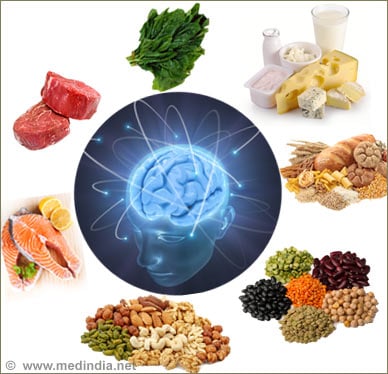- Deborah Herlax Enos, Healthy Bites, MyHealthNewsDaily
- Mitchell, Susan, and Christie, Catherine (1998). I''d Kill for a Cookie. New York: Dutton.
- Wurtman, R. J., and J. J. Wurtman (1989) "Carbohydrates and Depression." Scientific American (January): 68–75.
- Wurtman, J. (1989) "Carbohydrate Craving, Mood Changes, and Obesity." Journal of Clinical Psychiatry 49 (Suppl.) 37–39.
About
Many people have long believed that eating certain foods can influence a person’s mood — at least temporarily. Food that enters the body goes to make the constituent parts of the brain, is turned into the neurochemical messengers that make the brain operate and provides the energy for the brain to function. These neurochemical messengers are called as neurotransmitters. Apart from food, neurotransmitters are affected by many other factors, such as hormones, heredity, drugs, and alcohol. Three neurotransmitters-dopamine, norepinephrine, and serotonin-have been studied in relation to food, and this research has shown that neurotransmitters are produced in the brain from components of certain foods.

People are more alert when their brains are producing the neurotransmitters dopamine and norepinephrine, while serotonin production in the brain has been associated with a more calming effect (and even drowsiness in some people). A stable brain serotonin level is associated with positive mood. Women have a greater sensitivity to changes in the brain serotonin levels. Mood swings during the menstrual cycle and menopause are majorly due to hormonal changes that influence the production of serotonin.
The foods that increase the production of serotonin in the brain are the ones high in carbohydrates. This explains the drowsiness that sets in the afternoon after eating a large meal of pasta, rice, sweets, breads etc. Carbohydrates affect brain serotonin because they increase the levels of tryptophan in the brain. Tryptophan is an amino-acid and is the precursor of serotonin.
Dopamine and norepinephrine, produce a feeling of alertness.
This may be explained in context to two possible mechanisms.
- Blockage of serotonin production due to consumption of protein-rich foods, resulting in increased alertness or concentration
- Increase in the levels of dopamine and norepinephrine by the consumption of protein-rich foods.
Chocolate consumption stimulates the release of serotonin and endorphin into the body, which combine to produce a relaxed or euphoric feeling. This may explain why some people crave chocolate when they're feeling depressed. Another group of neurotransmitters that can influence mood and appetite are the endorphins. These produce a positive mood state, decreased pain sensitivity and reduced stress. Endorphins are released during starvation, and during exercise.
A food substance related to endorphins is phenylethylamine, found in chocolate. There has been strong evidence behind chocolate improving mood temporarily due to its high levels of sugar and fat, phenylethylamine, and caffeine. The sugar is associated with a release of the serotonin, and the fat and phenylethylamine are associated with an endorphin release.
| Nutrient | Foods rich in the nutrient | Neurotransmitter | Effect |
| Protein | Meat, Milk, Eggs, Cheese, Fish, Beans, lentils | Dopamine, Norepinephrine | Increased alertness, concentration |
| Carbohydrate (CHO) | Grains, pasta, biscuits, breads, sweets | Serotonin | Increased calmness, relaxation |
| Excess Calories | From any type of food | Reduced blood flow to the brain | Excess calories in a meal is associated with decreased alertness after the meal |
Deficiencies of certain nutrients in food can drastically affect the mood.
Folate: A recent study published in the journal Nutrition Reviews found that as many as 38 percent of adults with depressive disorders were deficient in folate. Researchers wrote that the deficiency may impair the body''s ability to produce neurotransmitters that act as mood stabilizers.
Thiamine: Thiamine can also help improve your mood. Studies show that an increase in thiamine levels is associated with improved mood. People with thiamine deficiency show signs of anorexia, muscle weakness, irritability and depression.
Magnesium: According to a 2006 article in the journal Medical Hypotheses patients recovered from major depression within 7 days of taking a magnesium supplement with each meal. Researchers have found that inadequate levels of magnesium in the body can result in damage to the brain's neurons, which may cause depression.
Consuming a balanced ‘whole foods diet’ filled with mood-boosting nutrients is the best way to keep stable.
Folate: Lentils, pulses, kidney beans, spinach, back beans, collard greens, turnip greens are among the most folate-dense foods
Thiamine: Tuna, sunflower seeds, dried peas, black beans, kidney beans, lentils, sesame seeds are foods rich in thiamine making them a really great mood-boosting food.
Magnesium: Wheat bran, pumpkin seeds, spinach, soybeans, sesame seeds, halibut, black beans, sunflower seeds, cashews, almonds, cocoa are all rich in magnesium.








